It’s that time of the year again folks!
I am always given warning that tax time is approaching because a number of clients start to ask for valuations of accounts, interpretation of some documents and also help with organising and sharing some documents with commercialisti.
Tax returns in Italy
By Gareth Horsfall
This article is published on: 2nd May 2025

However, regardless of anyone actually alerting me to the upcoming tax declaration in Italy, I always say that Easter time is a good time as any to nudge yourself into getting your financial documents in order for your ‘dichiarazione’ (if you haven’t done it already).
Never leave it too late! Commercialisti are run off their feet in the summer and can be hard to get hold of during their busiest time of the year, just when you or I are thinking about our holidays!
In this E-zine I am going to do an abbreviated version of the taxes that you may be subject to.
Nothing has really changed much from last year, so if you would like a longer explanation of what they are and why they are charged then you can check out my 2024 E-zine on the same subject, HERE.
(More on Italian country life at the end of this E.-zine if you are so inclined to keep reading on!)
TAX ON INCOME
INCOME TAX RATES FOR 2025 (IRPEF)
In a move to simplify the tax regime in Italy the tax bands have now moved from 4 to 3 in 2024.
| On the first € 28000 | 23% |
| € 28001 to € 50000 | 35% |
| € 50000+ | 43% |
PENSIONS
Most of my clients are in, or planning for, retirement to some degree and so understanding how your pension will be taxed as a resident in Italy is of paramount importance.
PRIVATE PENSIONS AND OCCUPATIONAL PENSIONS (Income tax rates – IRPEF)
Private pension provider income: 401K / IRA’s etc / Occupational pensions / Personal pension income / State pension or social security.
All these types of pension incomes fall into the income tax rates ( IRPEF), they are added together and the rates applied to the progressive bands of income.
GOVERNMENT DERIVED PENSIONS
(tax in country of origin unless Italian citizen!)
The definition according to the Italy / UK / USA double taxation convention 1988 is, paid from:
” a political or an administrative subdivision or a local authority”
The pension awarded is generally taxable only in the state in which it originates and tax is generally deducted at source in that country of origin, unless your are an Italian citizen and then it becomes taxable in Italy as well.
(Check the double taxation treaty from the country in which the pension payments originate)
(This income is not taken into account when calculating the tax on your other income sources in Italy, e.g. rental income, and it is not declared on your tax declaration in Italy)

2025: NO TAX AREA (€8500)
The NO TAX AREA applies to anyone receiving a pension, whilst resident in Italy (“pensioner” is defined as someone who is receiving official state benefits i.e., social security or state pension).
No distinction is made between pensions being paid from abroad or within Italy!
The NO TAX AREA is €8500 per annum.
It is important to understand that this is NOT an allowance but a tax credit system.
If your total income (reddito complessivo) is €8500 or less then all the tax payable on your pension will be provided as a tax credit.
HOWEVER, the more your total income, from all sources, increases over €8500, the more of the tax credit you lose.
If your total income is €50000 or above you would not receive any tax credit.
BANK ACCOUNTS AND DEPOSITS
A very simple to understand and acceptable €34.20 per annum is applied to each conto corrente e libretto di risparmio: current account or deposit account. This would typically include fixed deposits, short terms cash deposits, CD’s etc. The charge is the equivalent of the ‘imposta da bollo’ which is applied to all Italian deposit accounts each year.
(Money market accounts, premium Bonds in the UK and other deposit based instruments will not generally fall in this category and would be subject to wealth tax – see below)
Interest income is taxed at 26%.
INVESTMENT INCOME AND CAPITAL GAINS (26%)
A flat tax rate of 26% is payable on interest and income payments from capital and realised capital gains are also taxed at the same rate of 26%.
(Interest from Italian government bonds and government bonds from ‘white list’ countries are still taxed at 12.5% rather than 26%, as detailed above. This is another quirk of Italian tax law as this means that you pay less tax as a holder of government bonds in Pakistan or Kazakhstan, than a holder of corporate bonds from Italian giants ENI or FIAT).
If you are invested in NON-EU harmonised collective investment vehicles i.e. funds which are listed in a place outside the EU, then the gains and income from these assets are NOT taxed at the flat 26% rate in Italy, but would be added to the rest of your income for the year and taxed at your highest marginal rate of income tax! Funds or ETF’s, for example, which re listed in the UK with a GB ISIN code or in the US with an equivalent US number, would fall into this category.
This is particularly important for UK and USA domiciled assets. If you have a brokerage account with a group such as Fidelity or Vanguard or one of the many other asset management firms, or you invest through a platform such as Hargreaves Lansdown in the UK/USA, then depending on which assets you invest in could mean you are pushing yourself into a higher tax bracket on taxable gains and income for the year. Your portfolio may need restructuring for life in Italy!
WEALTH TAX ON ASSETS (0.2% PA)
Any financial assets other than property attract an annual wealth tax of 0.2% on the value of the asset as at the 31st December each year.
Here are examples of a few:
GENERAL INVESTMENT ACCOUNTS, ISAS, BROKERAGE ACCOUNTS, PLATFORMS, DISCRETIONARY MANAGED PORTFOLIO, DIRECT INVESTMENT IN FUNDS, STOCKS AND SHARES, COMMODITIES, ART WORK, CLASSIC CARS, ETC.
If the assets are located in one of tax regimes around the world which are considered fiscally privileged by the Italian authorities, then the rate of tax is 0.4% pa. The list can be found at the end of this article HERE
INCOME FROM OVERSEAS PROPERTY (Income tax rates – IRPEF)
Overseas net property income (after allowable expenses in the country in which is located) is added to your other income for the year and taxed at your highest progressive rate of income tax.
THE WEALTH TAX OF 1.06% ON THE VALUE OF THE PROPERY (IVIE)
For properties based in the EU, the value on which this tax is based is the Italian cadastral equivalent. You will find that the market value will, in most cases, to be significantly more than the cadastral equivalent value. For a list of the different tax values across Europe see the table below.
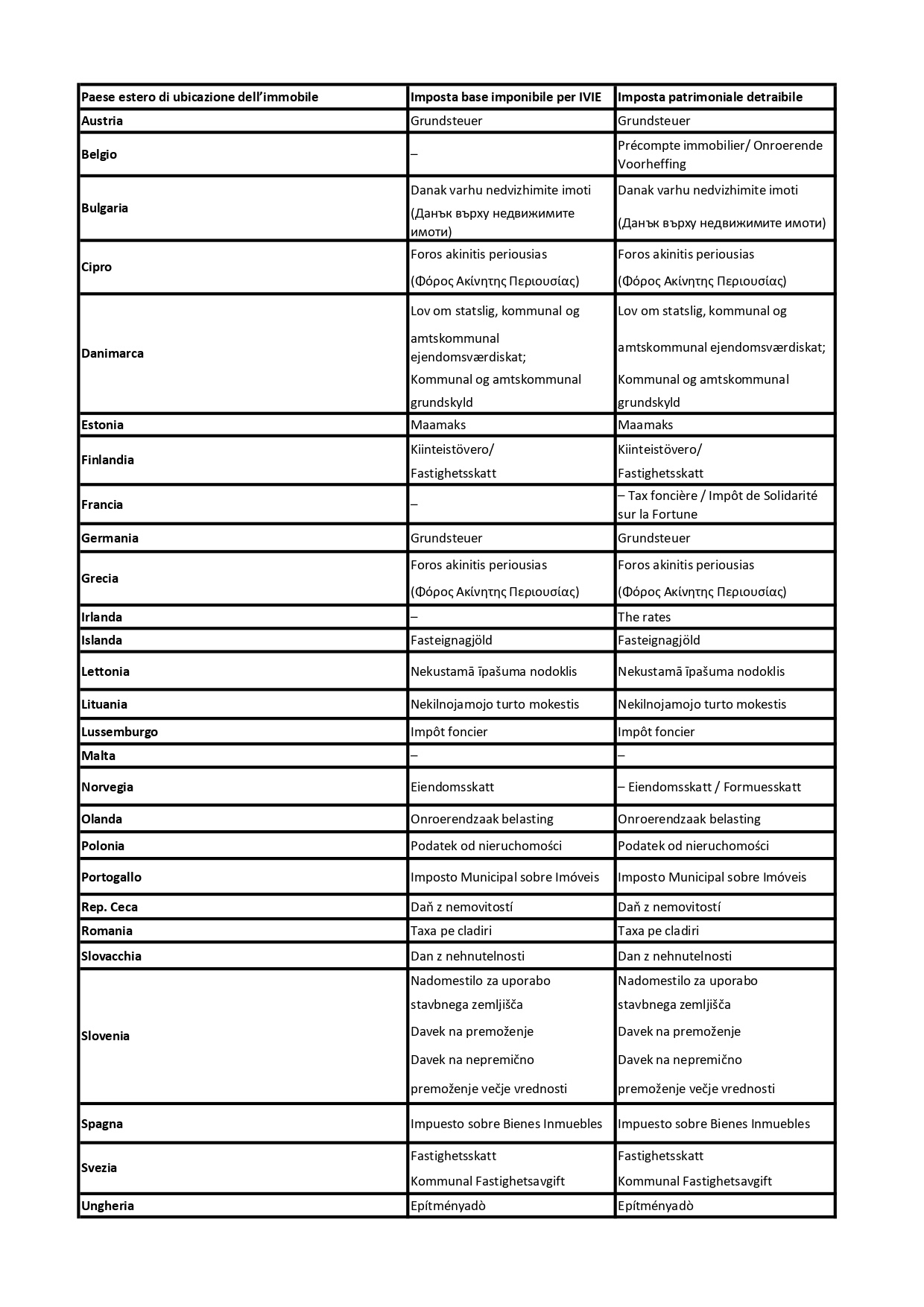
For properties located outside the EU (inc the UK/USA/Canada/Australia/NZ etc) the value for tax purposes is defined as the acquisition value (purchase /inherited/acquired) where this can be evidenced, otherwise it is the current market value of the property.
DISPOSAL OF PROPERTY
Disposal of properties both abroad and in Italy (exc prima casa) are not deemed speculative if you have owned the property for more than 5 full tax years and therefore are not capital gains tax liable on the disposal, in Italy.
NOTE: If you gain residency in Italy then by default your previous ‘first home’ or ‘family home’ for the purposes of the Italian tax authorities is now classified as an investment property. By definition, if you have a home in Italy and a property in another country, even if you consider this property your family home, it can no longer be considered your ‘Prima Casa’ for Italian tax purposes.
If you have any questions about any of these taxes and how they might apply to you and your individual financial situation, or if you think that you might be paying more than need to, then do get in touch and I will be happy to see if I can help you with your plans.
I can be contacted on email: gareth.horsfall@spectrum-ifa.com or on cell: +39 333 6492356
A QUICK UPDATE ON COUNTRY LIFE
The country life update seems to be garnering more interest than the financial talk, given the lovely feedback I have from many of you. I know many of you have already trodden this well worn path of moving to Italian rural homes and are involved in differing degrees with your properties and land management.
I am now slowing down a little bit as the spring has arrived and I see that the plants are literally exploding before my eyes. It seems futile to try and manage it too much when its all growing so quickly. However, it is hard to let go and I do find myself getting up in the morning and just having an hour or 2 on the land before work, or even on the weekend, where it rolls easily into 4 or 5 hours to the extent that my wife finally shouts from the window “Are we ever going to see you this weekend?”. At which point I know my day on the land is over, at least for that day.
Anyway, I know I have been telling many of you that I have refrained from cutting the grass under the olive trees to date. There is now good reason to be careful because as you will see below in the pictures, there are some new occupants of the land and I am a little reluctant to start mowing them down. (I have recently staked around them so I can get on with the grass cutting but without destroying the wild orchids).

I did however want to share a funny story. I bought a trattorino ( ride on lawn mower) in the January sales online, and got quite a good deal on it. However, given the weather had been quite cold up until about a month ago, the grass hadn’t really grown that much and so I put it in storage. I decided to start it up about a week ago, just to see how it went and as you might imagine, it didn’t start.
I was left with my trusty motorized lawnmower. ‘Che fatica!‘ as they say !! The trattorino ride on mower has now been fixed, under guarantee, (it was a broken fuse) and what a difference !!! A HUGE labour savings device.
On another note, I am finally starting, after the winter clean up of the land, to start looking at the border areas and wondering how I can tidy them up as well. A lot of trees and woodland needs to be at least trimmed back and will leave me with lots of material to deal with as always, given I need to do some fencing I was thinking about using this material in some way.
Facebook and social media, almost as soon as I started thinking about it, started pumping out lots of ideas from dead hedges, to woven fences and lots more. I am undecided, but might try my hand at some fence building at some point. It should be fun.
Interestingly, on our annual work and investment conference for The Spectrum IFA Group there has been lots of talk about the impact of Artificial Intelligence, on our lives, in the last few years.
In 2024 we were presented with a list of the jobs most at risk of AI, and those least at risk. At the bottom of the list was fence builder! They didn’t mention that this job might be at risk from Gareth, although the likelihood is that I will give it a try and make a mess and need to call a fence builder in the end, but at least I am guaranteed a nice human conversation instead of wondering if I am talking to an AI application.
This country life certainly has its challenges! I recently was sharing these experiences with someone and finished my emails by saying ‘1st world problems, I guess’. It was only on reflection that I thought that it’s probably one of the types of work that we actually have in common with people wherever they are from on the planet.
I won’t bore you with any more country life tales for this E-zine, but if you have any fence building ideas or want to talk about finances / tax, then please do get in touch!
Trump’s 100 days
Lastly, I thought I would leave you with a piece on Pres. Trump given that he is occupying a significant amount of time with conversations with you, at the moment ( and rightly so)
On April 29th he completed his first 100 days in office and his tone has softened, just slightly, in the last few days.
The article below was sent by one of our collaborative fund manager partners, VAM Funds and I thought I would share it as it’s a succinct article which explains what Trump is trying to do and his potential for success and possible hurdles along the way.
This is not one of my opinion piece’s but instead direct from the financial market people.
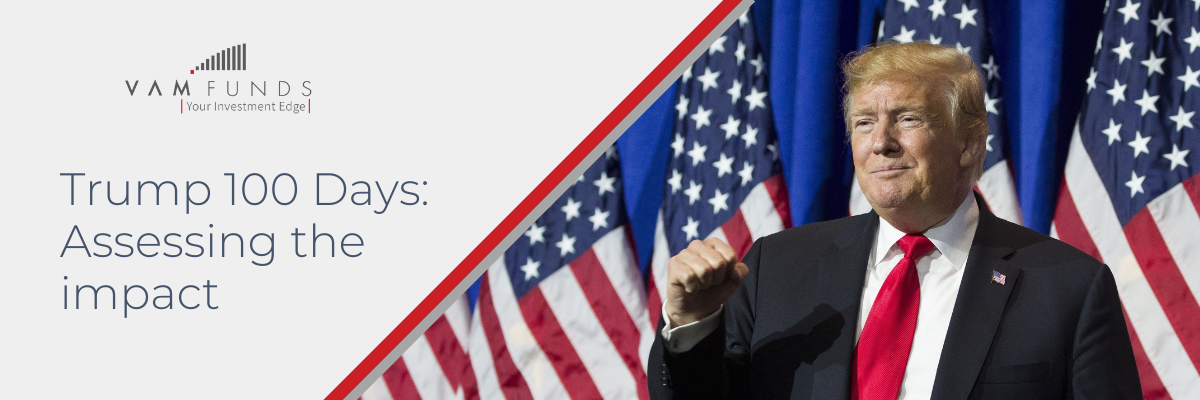
As Donald Trump approaches his first 100 days in office, a complex economic narrative emerges – challenging traditional approaches while attempting to address long-standing structural challenges. His presidency has introduced uncertainty and volatility, yet the broader economic context remains one of relative strength. This dynamic sets the current period apart from prior episodes of market turmoil.
Economic Context
The US faces critical economic pressures: a $2 trillion annual deficit, $36 trillion in national debt, and a declining manufacturing base. Trump’s approach represents an unconventional attempt to reimagine America’s economic positioning – neither entirely destructive nor completely transformative.
Yet, unlike previous periods of market unease, the economy today shows notable resilience. US unemployment remains near historic lows, corporate earnings continue to post positive growth, and balance sheets are broadly solid. Credit markets, while reflecting some spread widening, remain stable and not excessively leveraged. In many ways, the economy itself is not the root of the current turbulence.
The singular variable creating uncertainty is Trump himself. Markets are reacting less to economic fundamentals and more to political risk.
Against this backdrop, Trump’s strategy can be broken down into three core themes that shape his economic agenda:
| Trade Recalibration | Structural Economic Challenges | Economic Repositioning |
| Challenging existing global supply chain dependencies | Addressing long-term fiscal sustainability | Reviving domestic manufacturing |
| Seeking "fair trade" rather than pure free trade | Acknowledging the limits of current economic models | Reducing over-reliance on specific global partners |
| Attempting to redirect, not eliminate, global economic relationships | Proposing radical, and sometimes necessary, interventions | Balancing potential opportunity with heightened geopolitical risk |
Market Dynamics
Investors are navigating a landscape marked by uncertainty, but underpinned by strength. Unlike past episodes where systemic weakness drove market corrections, this time, economic indicators remain broadly constructive.
The real concern is political instability. Trump’s unpredictable tactics have jolted investor confidence, even though the macroeconomic foundations remain intact. However, his motivations are clear: he is ultimately driven to prove that he can build a robust U.S. economy, contain inflation, and secure strategic wins in the global trade arena.
With the 2026 mid-term election cycle beginning as early as Q1/Q2 next year, Trump cannot afford to alienate voters or lose his party’s slim Congressional majority. This political imperative may lead to quick policy “off ramps,” efforts to de-escalate tensions, and the search for visible wins – moves that could rapidly calm markets.
Indeed, any signs of stabilising rhetoric or resolution to current crises may spark an equally swift rebound in both equity and fixed income markets.
Structure in Chaos
Trump’s economic policy is neither pure economic nationalism nor traditional globalism. It is a hybrid approach – an improvised balancing act between disruption and adaptation characterised by:
· Challenging existing economic orthodoxy
· Acknowledging global economic interdependence
· Pursuing strategic economic repositioning
with the following potential outcomes:
· Possible supply chain diversification
· Increased domestic economic resilience
· Risk of short-term market volatility
· Long-term structural economic recalibration
Conclusion
Trump’s first 100 days signal a high stakes experiment in economic leadership. The market’s turmoil is not a reflection of economic collapse but of political unpredictability. Yet, the core economy remains resilient.
Should Trump pivot towards pragmatism – seeking quick wins, stabilising policy narratives, and presenting a clearer economic roadmap – the same markets that reacted sharply to uncertainty may respond just as swiftly to renewed clarity.
Are You Leaving 40% of Your Assets to the Taxman?
By Jett Parker-Holland
This article is published on: 22nd April 2025

Most people try to do the right thing. They work hard, save diligently, contribute to their pensions, and even invest in property to secure a comfortable retirement and leave something behind for their loved ones. It’s the responsible thing to do, but recent changes to the UK tax system have turned that logic on its head, especially for British expats living abroad or planning to retire in Spain.
As of April 2025, a new inheritance tax test will be introduced, replacing the ambiguous concept of domicile with a more definitive measure: residency. If you are living—or planning to live—in Spain for the long term, this change affects you directly. Under the new rules, if you have lived outside the UK for at least 10 of the last 20 years, you’ll be classified as a non-UK Long-Term Resident. This is important because it means your overseas assets will no longer be subject to UK Inheritance Tax (IHT); however, UK-based assets such as pensions, property, and bank accounts will still be taxed at 40%.
For many clients, much of their estate remains tied up in the UK. This includes UK property, bank accounts, and—most notably—UK pensions. Although yields on UK assets like rental property or fixed-term bank deposits can appear attractive, the long-term benefit may be diminished if 40% of the value is lost to IHT on death. Because of this, those planning to live in Spain for the long term may want to consider moving certain assets out of the UK tax system. It’s an area where careful financial planning can make a real difference.
The same applies to pensions. Under the old regime, UK pensions were exempt from IHT. Now, pensions are included as part of your estate. If you pass away after age 75, your beneficiaries could face a 40% IHT charge, and potentially up to another 45% in income tax when they take money out of the pension. It’s a harsh reality and fundamentally changes how we should value UK pensions. If your beneficiaries can’t access the full pot, it’s simply not as valuable as it once was. Under these conditions, a £400,000 pension could lose £160,000 to IHT alone.
At Spectrum, we specialise in cross-border financial planning. We can help you review your UK assets and explore options to reduce your exposure to unnecessary taxes, ensuring more of your hard-earned wealth stays with your family, not the taxman.
If you’re living in Spain, or planning to, and you’re unsure how these changes affect you, this may be a good time to review your plans. A short conversation could help secure your legacy.
If you would like to discuss your situation in more detail and explore your options, please feel free to contact me directly for a no-obligation consultation.
Navigating Offshore Banking: What Superyacht Crew Need to Know
By Tom Worthington
This article is published on: 18th April 2025

For those working aboard superyachts, managing finances across multiple countries is part of the job. Offshore banking is a common topic in the industry, but what does it actually mean? More importantly, how can superyacht crew members ensure they use offshore accounts legally and effectively?
What is an Offshore Account?
An offshore account is a bank account held outside the account holder’s country of residence. These accounts are often established in jurisdictions known for financial privacy, currency flexibility, and, in some cases, tax efficiency. Common offshore banking hubs include Switzerland, the Cayman Islands, Singapore, and Luxembourg.
Key Features of Offshore Accounts
• Multi-Currency Access – Useful for those paid in different currencies or working in international waters.
• Privacy & Confidentiality – Some jurisdictions have strict banking secrecy laws.
• Tax Efficiency – Depending on residency status, offshore accounts may offer tax advantages.
• Asset Protection – Offshore banking can safeguard funds from political instability or legal claims.
Are Offshore Accounts Legal?
Yes. Offshore banking is entirely legal, provided account holders comply with tax reporting obligations in their country of residence. Many governments enforce strict regulations requiring individuals to disclose offshore accounts.
Key compliance measures include:
• Common Reporting Standard (CRS) – Over 120 countries automatically share offshore account data with tax authorities.
• Foreign Account Tax Compliance Act (FATCA) – A U.S. law requiring Americans to report foreign financial accounts.
Failure to disclose offshore accounts can result in heavy fines, tax penalties, or even legal action. However, when used correctly, offshore accounts serve legitimate purposes such as international transactions, estate planning, and investment diversification.
How Offshore Banking is Enforced
The days of absolute banking secrecy are over. Since the introduction of CRS in 2018, tax authorities worldwide have cracked down on undisclosed offshore assets. Here are a few key examples:
Switzerland’s Secrecy Crumbles
• Over 3.1 million accounts worth €1.3 trillion were reported in the first year of CRS.
• Countries like France, Germany, and Italy used this data to launch tax audits on individuals with undeclared Swiss accounts.
• Many account holders voluntarily disclosed assets to avoid penalties.
Spain’s Offshore Crackdown
• Over 11,000 undisclosed offshore accounts were uncovered from 2020-2023.
• Tax authorities recovered millions in unpaid taxes and issued heavy fines.
• High-profile cases, including football stars like Cristiano Ronaldo and Lionel Messi, highlighted the risks of offshore tax evasion.
UK’s HMRC Recovers £570 Million
• The UK’s tax authority identified over 150,000 residents with hidden offshore accounts.
• £570 million was recovered in unpaid taxes.
• Stricter penalties were introduced for failure to declare offshore wealth.

What This Means for Superyacht Crew
Superyacht crew frequently work across jurisdictions, earning salaries in different currencies and often living outside their home country.
This can make offshore banking an attractive option, but it’s crucial to remain compliant with tax laws.
Key Considerations:
• Know Your Tax Residency – Your tax obligations depend on where you are officially resident, not just where you work.
• Report Your Offshore Accounts – Avoid penalties by declaring foreign accounts where required.
• Seek Professional Advice – Offshore banking and tax laws are complex. Consulting a financial adviser who understands the yachting industry can help navigate the rules effectively.
Final Thoughts
Offshore banking is a useful financial tool when used correctly. However, with increasing transparency and global information-sharing agreements like CRS, hiding offshore assets is no longer an option.
Superyacht crew should approach offshore banking with full awareness of their legal responsibilities to ensure financial security without unnecessary risks.
To make sure you are doing it properly, feel free to contact Tom
When markets turn volatile
By Gareth Horsfall
This article is published on: 10th April 2025

Well, as you might have expected I have decided to write to you at this particularly fragile moment in world politics, and which has now reverberated around world investment markets. As of Friday last week a sell off started in the equity markets which effectively created a bear market situation around the world for fears of global recession based on the Trump tariffs. (as of today we have seena slight rebound, but more volatility is likely)

Given this, you may be forgiven for wondering why I am leading this E-zine with a picture of one of my apple trees in full blossom on my land?
Last weekend I was away from home, spending time in the North of Italy with friends, to celebrate my wife’s 50th birthday. Seeing what had happened on Friday, starting with the sell off in equity markets, I returned home wondering how to deal with it. I could have thrown myself in front of the computer and sent you a lot of charts about how you need to ‘sit tight and ride it through the rises and falls’ or ‘it’s time in the markets that counts not timing the markets’ and ‘the real threat is inflation, not investment market volatility’, (you won’t get away from these points…….you can find these further down the page!), but instead I took an hour in the morning to get my thoughts together and went out on the land to do some tidying up after the olive pruning and to check out the health of the blooming trees.
This apple tree made me take stock of the situation and I will explain why.
When we bought the house last year, the land and house itself had been left abandoned for quite some years and it needed not just a clearing up, but also some TLC. This apple tree was a case in point. Last summer this tree produced 3 very ugly and unhealthy looking apples. The tree itself looked like it had given up the hope and it entered its winter phase looking like it was on its last legs.
I was in 2 minds to pull up the tree and plant something else. However, I thought I would give it another chance, so, I spent the winter pruning the tree and giving it some nutrients. I cut off the bad old rotten wood and reshaped the tree into a form which would allow it space to breath and allow the light to penetrate deep into the centre, so that flowers and fruit could develop.
I was careful not to over do it so as not to stress it too much!!
This, I am happy to say, is the result. What looks like a pretty healthy tree! It is now in full bloom, the bees are all over it and I expect that it may very well provide some decent fruit this year, albeit still quite a young tree.
Comparisons with markets
You will have guessed by now the point I am trying to make about the apple tree. Sometimes, when all hope seems to be lost there may just be hope around the corner with the right care and attention.
I will caveat the rest of this E-zine by stating that I am not wholly against the Trump’s tariffs. I am 100% against the way he is going about it: his morally dubious behaviour, his manner and potentially corrupt allies but we will leave that for another time! I can also kind of understand what he is trying to do, (bringing business back to the US from overseas), but the way he is going about it is nothing short of ludicrous.
In my opinion, what seems to be happening with the Trump’s administration is that there is a pull back from the last 20/30/40 years ( I am not quite sure of the length of time) of globalisation. We are moving more towards nations becoming more protectionist, rather then more global in nature. Is this a bad thing? It’s difficult for me to tell.
Certainly when we look at tariffs, the US has had a reasonably free and open market for most of this time and yet most other nations around the world have not played by the same rules. Free market capitalism works fine when everyone plays by the same rule book and reduces tariffs respectively, but when one plays by one set of rules and another by a separate set of rules, then imbalances are going to arise. I think this is what we are now seeing a push back against. Pres. Trump is saying that the imbalances have been one sided (true or not, I am not at liberty to say) to the detriment of the USA. To some degree I can see his point, although I understand that it is not as black and white as that.

European cars
This morning I saw that Pres. Trump was referencing the fact that European car manufacturers have always had a relatively easy time importing cars into the USA and that the US has lots of BMW’s and Mercedes and VW etc, but that you don’t see many American cars in Europe. On that point he is right. Now, that might be due to the fact that they are too big and we don’t want them, or that they consume so much fuel that they don’t make sense based on the price we pay at the pump, or it could be that there are restrictive trade measures to prevent US cars from entering into the EU market. I don’t know the details but maybe it’s a combination of them all.
Yesterday, I also went to our local Chinese store to get a few bits and pieces and was reflecting on the low prices of goods in these Chinese stores and on the new Chinese online store Temu. Again, I am not an economics expert or even know anything about tariffs between the EU and China, but, just by observation I ask myself why these Chinese goods are so cheap in Europe and yet we have a lack of Italian businesses manufacturing similar goods. Is it that the Chinese are willing to work harder and be paid less to produce the same goods? Have we really sold out EU manufacturing to lower cost countries? Is it tariffs are lower in the EU for Chinese goods than reciprocal tariffs in China, I have no idea but this particular moment in global politics does get me wondering.
If anyone knows please do feel free to let me know!
My point is, what if Trump is right? What if there are imbalances in world trade that need to be corrected and this is the way to do it? What if it can reindustrialise the USA?
(I very much doubt this by the way as I saw a list of companies who have announced significant investment and manufacturing in the USA since this trade war started and they are mainly AI firms and manufacturers of high level semiconductors etc. These firms are very unlikely to need rust belt workers to work in factories where they are more reliant on robotics and highly sophisticated machinery. That being said, bringing back the production of essential computer components for industry and defence also has some merit).
However, to give him the benefit of the doubt, what if there is some merit in taking short term pain to try and achieve long term gain?
If Pres. Trump can pull even a small % of manufacturing from China to the USA and create more national independence on its goods and services, and improve national security , may he have achieved his goal? It does feel like an end of empire last grasp at power, scenario, but maybe this will mean that the USA can retain it’s No 1 global economic powerhouse status for some time to come.

Markets speak in the US
So moving away from my random hypotheses, let’s dwell on markets and the horrible news that our portfolios have fallen in value once again but, before I do, if you have been an investor for years, I would ask you to reflect on just the last 5 years for a moment.
What did you think when a global pandemic hit? Businesses were shut, schools too, everyone was told to stay at home and not interact with each other without a mask on and to stay 6 metres away from others? The markets tanked as a result.
What was your reaction? Maybe we were too distracted by the pandemic to really pay much attention – and rightly so! but what about when Russian invaded Ukraine and it sent global markets into a panic and a global inflation spike, sending us from years of disinflation and near zero interest rates, to an overnight significant rise in prices which to date continues. Did you panic sell off your portfolio?
Probably the answer is no and you did the right thing because markets rebounded (albeit more slowly after the Russia Ukraine war) but they did and the same happened after 2008 Financial Crisis and 2010 Euro crisis: hanging on and riding through the panic was the best thing to do… and it is now!
You might argue ‘It’s different this time’ ; the whole world is changing and markets will never recover. If you think this then I would coach you to read the book, ‘It’s different this time -Eight Centuries of Financial Folly’ by Reinhart and Rogoff. Largely financial markets are governed by human behaviour and that has not changed since time began, or at least over the last 8 centuries according to the data they present.
Please also bear in mind that success for every US President is judged on the US stock market. Most, if not all Americans, have significant assets invested in the US stock market and so it is a sign of health of the US economy and more importantly a measure of the US Presidents success at home ( interestingly, Pres. Trump’s favourability ratings have increased from 48% at election time to 53% now. clearly, he is increasingly approved of in the USA).
After reading so much on this topic and trying to syphon through the almost hourly noise, my view is that he is front loading all the bad news now to get it out of the way. He knows that come the mid-terms in 2026 he needs to have made significant inroads into making good on his promises to the American people and for that reason he is getting the worst out of the way now, whilst he can, after which a flurry of good news will likely follow.

Trump’s strategy
So, moving away from the media hype and screaming economists for a moment, let’s take a look at what Pres. Trump is really trying to achieve.
Pres. Trump watches consumer confidence closer than anything and in order to keep it high he has to achieve 3 goals:
1. Get oil prices lower
Gas at the pump is the beating heart of the America middle class and the Trump administration will go to any lengths to reduce the price of oil at the pumps. (When I was in New York in February the gas at the pump, I calculated, cost €1 a litre!!!!!!! – compare that to the the €1.59 a litre, this morning, that I just paid for diesel. Petrol was €0.20 higher still). So, if this administration can reduce gas prices further that could stimulate a mini economic boom in the US.
Bear in mind that the US is already the worlds largest producer of oil at 40% higher than its nearest competitor ( Saudi Arabia). Pres. Trump has stated clearly that he wants to aim for 100% energy independence and I think they will not just aim for it but do it at any cost.
(It should be noted that I paid €1.59 a litre for diesel this morning. 1 week ago it was €1.67. – Is his strategy working?)
2. Mortgages are the second lever to pull
If he wants the American public to gain confidence in his policies then he needs to give them breathing room economically (i.e. more money in their pockets) and he can then continue to go about reshaping the US economy . (At time of writing, with pressure building on a possible recession, pressure is equally being heaved on Jerome Powell – head of the Federal Reserve, to reduce interest rates). Was the market correction manufactured to some degree, or at least expected, to pressure the Fed to reduce interest rates?
This administration has also openly stated that they will also look to deregulate the banking industry, to release them from overly administrative and bureaucratic procedures and to allow them to get back to banking. This will also assist in bringing interest rates down. (This point I can fully agree with :banking regulation, anti money laundering legislation, source of wealth and origin of wealth obligatory requirements have become, quite frankly , out of control and any simplification in this regard, in my opinion, is warranted).
3. Lastly – the Trump administration will focus on food price inflation
Remember to watch out for the first 100 days of the Pres. Trump term which is often linked to his early successes; the 100th day lands on April the 29th!
So, there you have it, a few thoughts of my own on the Trump administration and why it might not be as bad as it seems.
So, let me turn to the technical for a moment: some data about market volatility.
The data below courtesy of one of our investment management partners, New Horizon Investment Management.
When markets turn volatile, perspective is everything
This market volatility feels tumultuous but, of course, we’ve been here before. The table below reveals that after severe drawdowns, the market has often recovered the full decline and finished the year strongly positive.
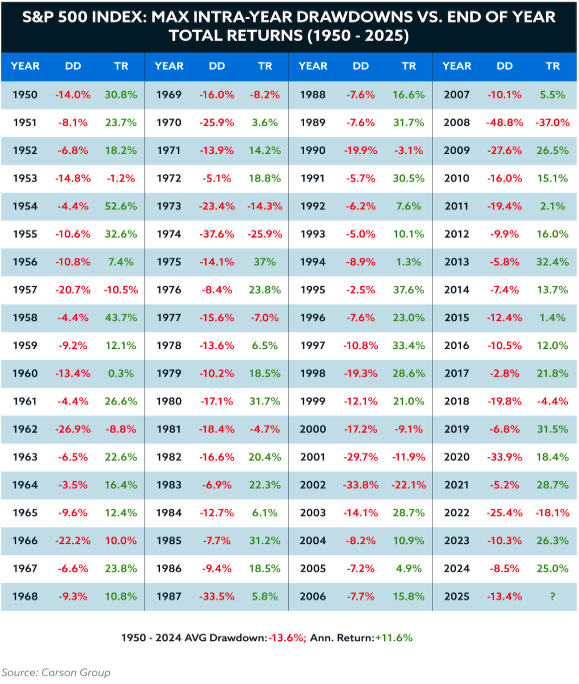
Years to Note:
- 1970: Market fell -26% from peak to trough… yet ended +3.6%
- 1975: Dropped -14.1%, but closed the year up +37%
- 1987 (Black Monday): Down -33.5% mid-year, still finished +5.8%
- 2009: Deep in the Global Financial Crisis, dropped -27.6%, yet ended +26.5%
- 2020: COVID crash brought a -33.9% drawdown… ended +18.4%
On each occasion, the best course of action would have been to avoid the noise and stay invested.
“History doesn’t repeat itself, but it often rhymes.” – Mark Twain
Whatever happens in the market we have bigger things to worry about!
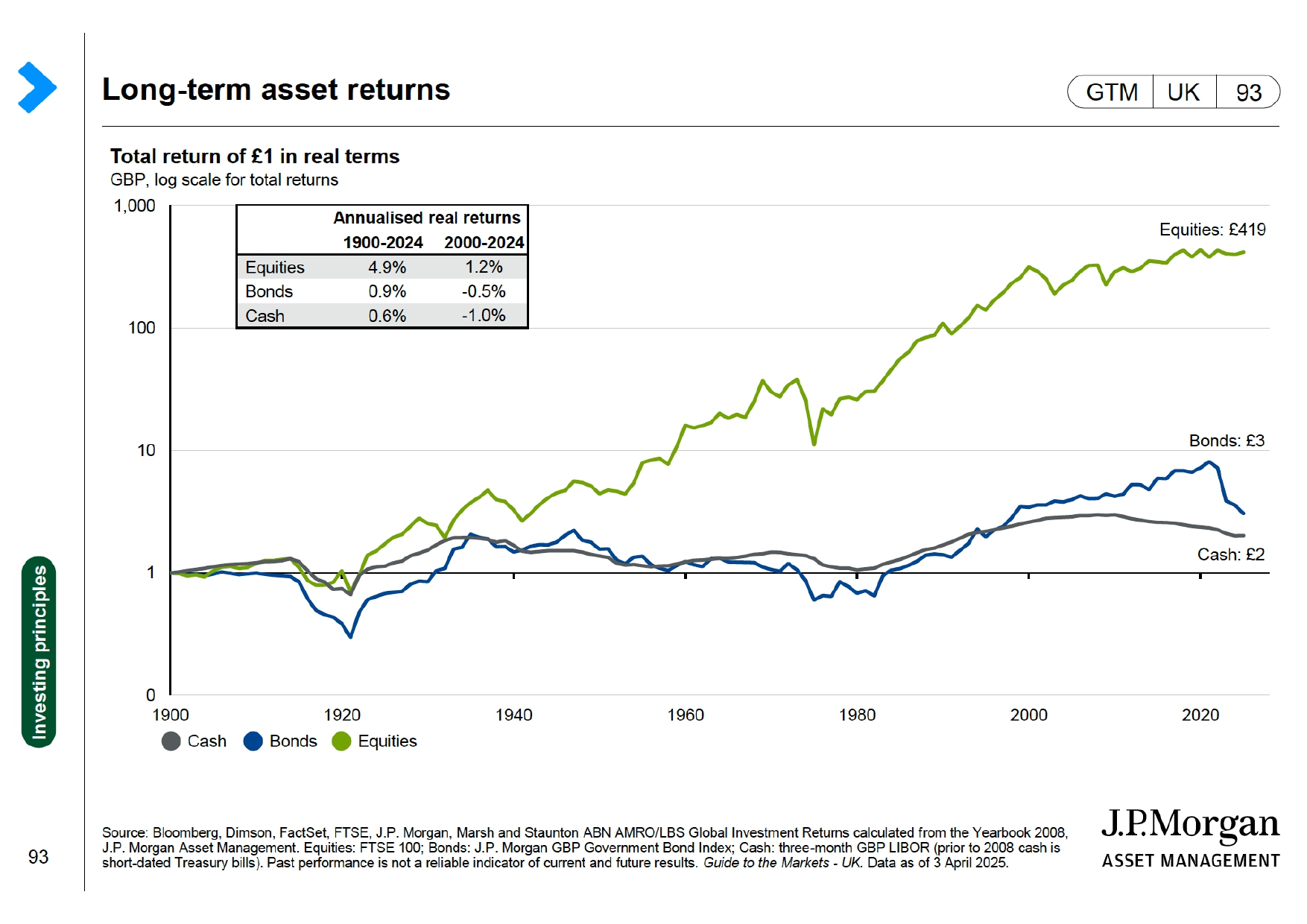
Besides, when markets sell off, why on earth would you not buy into them at these prices? They are at bargain basement prices and as the saying goes ‘fill your boots!’ I had a measly amount of cash available to invest and have taken advantage of these prices.
Let me tell you a couple of my own investment tales:
My first tale which I have written about before was during the financial crisis of 2008 ( which by the way was a many times worse than what we are going through today) and my wife had just sold a house in the UK and we had some cash to invest. I knew I had to invest but I was very nervous because, working at the coal face of what was happening at that time, I knew that things were very serious. However, I also knew the theory of markets and that the best time to buy was in the height of the chaos. I went for it and the next 3 months were tragic and I lost 20% in value on the portfolio. (I never told me wife!) 6 months later the portfolio was up 45% ! It should be noted that I am an adventurous investor profile and so was invested 100% in equity ; it was a wild ride I can tell you but I knew the logic and I just had to be patient. Later we needed that money for something else and had to sell a sizeable portion of it, but it did its job.
My other tale is that at the start of my career as a financial planner I thought I was smarter than the market itself and that I could time my way in. I waited and waited and…. waited for the right entry point, waiting for a decent correction to buy in at the price I deemed to be right. I arrogantly waited 6 years before buying in! (What an idiot!) I can’t even bring myself to calculate the gains that I missed in those 6 years even with the correction that happened.
Lesson: It’s time in the markets, not timing the markets, that counts…
As I said to someone recently “I have made all the mistakes in the books, so you don’t have to!”

Inflation
Finally, let’s talk about inflation. Here I take the words of Charles D Ellis who wrote the book ‘Winning the Losers Game – Timeless strategies for successful investing’.
“For individual investors, inflation has usually been the major problem – not the attention getting daily or cyclical changes in security prices that most investors fret about. The corrosive power of inflation is truly daunting. At 5% inflation the purchasing power of your money is cut in half in less than 15 years and cut in half again in the next 15. At 7% your purchasing power drops to 25 % of its present level in just 21 years- the elapsed time between early retirement at age 61 and age 82, an increasingly normal life expectancy“.
Again, it might be useful to provide some perspective here because the all so surreptitious march of inflation is often upon us when we notice it, by which time it is far too late to do anything about it.
1. The price of my journey to Rome on the autostrada from Orte has increased from €4.50 in 2024 to €4.80 in 2025. That’s a 6.6% increase. I track this price and it has never, in my 20 years in Italy, increased at inflation levels or under. Always above!
2. The water machine in central Amelia, where I go to fill our drinking water bottles was 5 cents for a litre and half, they have just changed the machine and it’s now 5 cents a litre. That’s a 33.3% increase. (It’s hardly breaking the bank but a great example)
3. The news on RAI announced a few nights ago that the price of Colomba Easter cake is up 31% year on year and Easter eggs up 26%.
4. I took my son to KFC 2 weeks ago, reluctantly, and asked for the 4 large pieces of chicken. The last time I went to KFC was about 15 years ago and I remember these 4 huge pieces of chicken. Now, the 4 pieces resembled the size of 4 larger nuggets. Shrink inflation in practice so if you can’t increase your prices, reduce the amount of product. It has the same effect !
OK, I hear you say ‘These are not everyday items’ but they do reflect the general trend of the stealthy march of inflation.
Be under no illusion that this is your main financial enemy and investing is your only tool to protect yourself from it!
Investing requires patience and courage…or a financial adviser who you can ring and let off some steam. Make sure you can tap into any of these things if you get concerned about world events and market volatility!
So, on this happy point let me leave you with this information about the life ahead of you.
Life Expectancy
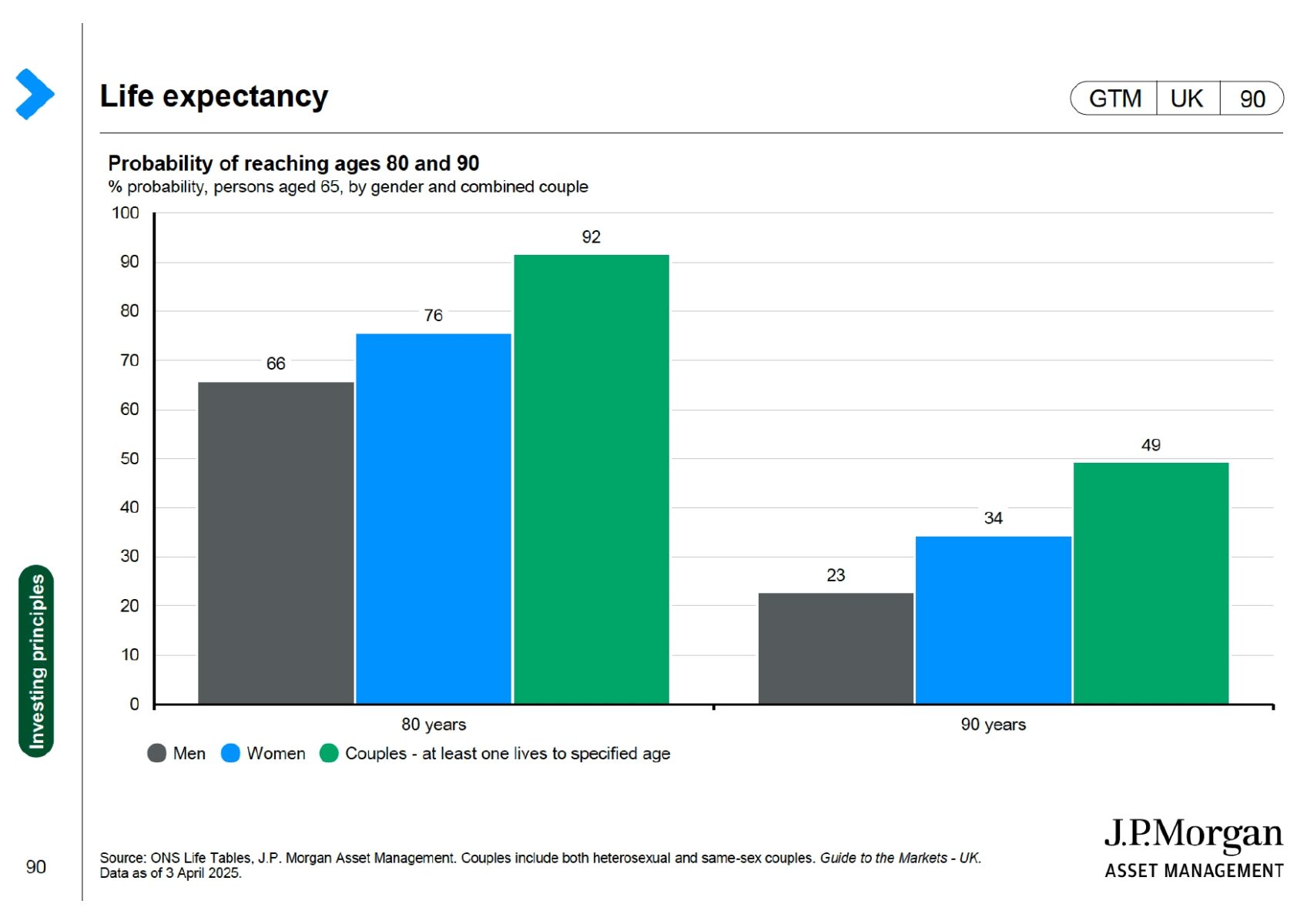
More people needing to finance live beyond 90th birthday
- Ratio of women over age 90 to men was about 2:1 in 2023
- The number of people aged 90+ has doubled over the last 30 years
- The ratio of women over age 90 to men was 2:1 in 2023 compared to 4:1 in the 1980’s. About one in every 100 people is now aged at least 90.
- The odds of living to beyond 90 are high enough that people shouldn’t assume it can’t happen to them. Historically, this has been mainly women but the numbers of men are catching up fast.
- For those who are age 66 this year there is about a one in 3 chance (33%) for men and nearly an evens chance (46%) for women of making it to at least age 90 and if they do get to age 90 there is nearly an even chance they will survive to beyond 9%
The message: Think long term and not Donald Trump term!
If you would like to let off some steam with me or discuss any of what is going on in the world, tax or financial planning related issues in Italy then please don’t hesitate to contact me on: gareth.horsfall@spectrum-ifa.com or call / message on +39 3336492356
Always happy to help where I can!
Financial Market Update April 2025
By Peter Brooke
This article is published on: 8th April 2025

Uncertainty leads to Volatility
Quite understandably my inbox has been full of messages from concerned clients and musings from commentators and investment managers about how to respond to the current market reaction to President Trump’s raft of tariffs.
The uncertainty around how these tariffs will play out has led to large falls in stock markets, especially the US.
As discussed in my last newsletter Lets Talk About Risk, volatility is an important and unavoidable part of investing and will be negated by time in the market and can provide great opportunities. The key is to ‘stay the course’ and try and ‘see through the noise’.
However, I did want to get something out to you with some current thoughts about what is happening, what might happen in the near future and why ‘staying the course’ is the best option.

We’ve Been Here Before
When markets turn volatile, perspective is everything.
The past week feels pretty tumultuous but, of course, we’ve been here before.
The table below shows the maximum intra-year drawdowns (DD) and end-of-year total returns (TR) for the S&P 500 from 1950 to 2025.
It reveals that after severe drawdowns, the market has often recovered the full decline and finished the year strongly positive.

Years to Note:
- 1970: Market fell -26% from peak to trough… yet ended +3.6%
- 1975: Dropped -14.1%, but closed the year up +37%
- 1987 (Black Monday): Down -33.5% mid-year, still finished +5.8%
- 2009: Deep in the Global Financial Crisis, dropped -27.6%, yet ended +26.5%
- 2020: COVID crash brought a -33.9% drawdown… ended +18.4%
On each occasion, the best course of action would have been to avoid the noise and stay invested.
“History doesn’t repeat itself, but it often rhymes.”
I hope that the above shows that though periods of volatility will always happen and always be temporary it is best to stay the course and try and avoid the noise;
I do appreciate that it is difficult with today’s ‘news’ channels adding to the feeling of panic on an hourly basis so I have shared below some links from firms much closer to the markets to share more detail about what is happening and what investors should consider in these temporarily volatile times.
Traversing Trump tariffs by Daniel Casali, Chief Investment Strategist at Evelyn Partners
Trump’s tariffs: how should investors respond? From Rathbones Investment Management
I would like, once again, to thank these expert commentators and the team at New Horizon Asset Management for their quick and important updates to a challenging situation.

Talk to me
As always, please remember that financial decisions should be made with careful consideration of individual circumstances and professional advice, I am here to support you.
If you have missed any previous news and updates these can all be found on the archive page here.
If you have any questions please use the the below channels, or the booking system – always drop me a quick message if you need a time slot outside of those available.
Mobile & Whatsapp: +33 6 87 13 68 71
Email: peter.brooke@spectrum-ifa.com
Facebook: Peter Brooke – Financial Advice
Calendly: https://calendly.com/peterbrooke/30min
New UK IHT rules
By John Hayward
This article is published on: 7th April 2025

As of 6th April 2025, several significant changes to inheritance tax (IHT) laws have been implemented in the United Kingdom. For the purposes of this article, I will focus on those people that I deal with in the main, namely UK nationals who are tax resident in Spain.
From a UK perspective, under the new rules, an individual will be classified as a “Long-Term Resident” (LTR) if they have been UK tax resident for at least 10 out of the previous 20 tax years. LTRs will be subject to IHT on their worldwide assets. Conversely, UK nationals who have lived in Spain for 10 out of the previous 20 years will only be liable for IHT on UK-situated assets.
For individuals planning to leave the UK, there will be a “tail” period during which their worldwide assets remain subject to UK IHT. The duration of this tail depends on the number of years the individual was UK resident, ranging from three to ten years.

Inheritance Tax threshold freeze
The IHT threshold, the nil-rate band, which determines the value above which estates are subject to tax, is frozen until 2030. In other words, the value of an estate may increase but the allowance will not. The threshold for the majority of those affected is £325,000. This means that estates valued above this threshold will be taxed at 40%. As there is an inter-spouse exemption in the UK, the surviving spouse will normally inherit the deceased’s allowance creating an allowance of £650,000. There is no such exemption in Spain but, depending on where someone lives in Spain, a beneficiary might be eligible for an allowance to be applied. These (Spanish) tax rules have changed regularly over the two decades that I have lived in Spain and so it is probably wise not to put too much reliance on them for long-term financial planning.

Inclusion of pensions in Inheritance Tax
Beginning in April 2027, pension funds will be considered part of the assets subject to IHT. This means that pension funds outside the UK could be exempt. At the same time, the UK has recently introduced a 25% charge for moving pension funds to overseas schemes (QROPS). Although this might appear to put the final nail in the coffin of the overseas pension transfer market, there could be a Lazarus moment. In simple terms, if a UK based pension fund is valued at £1,000,000 and is moved to QROPS, the fund would reduce to £750,000 after applying the 25% charge. For those who prefer skiing (spending the kids’ inheritance) the same fund left in the UK pension could be subject to a 40% IHT charge, obviously more than if the fund had been transferred with a 25% charge. Growth assumptions and other factors will need to be considered but overseas transfers cannot be ignored.

How UK and Spanish IHT apply to Spanish compliant bonds
As we can see, assets in the UK will be subject to UK IHT. Why not just move cash from the UK to Spain? The problem here is that this opens the Spanish tax door.
As well as bank deposits, there might be ISAs and other UK investment plans which will be subject to UK IHT. UK advice has been restricted since Brexit and, for most tax residents of Spain, holding certain assets in the UK is simply not tax efficient. But moving everything to Spain could also cause problems.

Investment options
We arrange investment bonds, often referred to as Spanish compliant bonds, which are recognised as insurance policies and benefit from the favourable tax treatment in Spain even though they are not situated in Spain. The bonds we recommend are based in Ireland and Luxembourg, both in the EU, satisfying Spain’s conditions. For Spanish IHT, Spain will tax the individual receiving the benefit if either a) the beneficiary is resident in Spain or b) the asset is in Spain. This means that a UK resident beneficiary will not pay Spanish IHT on the bond. Equally, if the deceased is a non-Long Term Resident of the UK under the new rules, the bond will not be part of a UK IHT calculation.
The main aim of a Spanish compliant bond is to increase the value of the underlying investment whilst putting clients in a position to supplement their income. Of course, any investment should reflect the tax regime of the country that the person is resident in. The bonds can move with the individual for these purposes. For example, whilst a resident of Spain, the Spanish tax deferral rules apply. If the person moves back to the UK, the UK rules then apply with the added benefit that tax relief available in respect of time spent outside the UK.
For more information on how we can help you position your money in the most tax efficient manner, contact me at john.hayward@spectrum-ifa.com or (0034) 618 204 731 (WhatsApp).
NHR 2.0 Portugal
By Portugal team
This article is published on: 5th April 2025

Portugal’s New Tax-Free Scheme:
Do You Qualify?
Offering generous tax incentives, including tax-free pension income (later taxed at 10% from April 2020), tax-free interest and dividends, and the ability to generate certain capital gains free of tax, Portugal´s popular Non-Habitual Residence
(NHR) scheme has been attracting new residents to Portugal since 2008. The NHR scheme was canceled with effect from October 2023, but some individuals were still able to qualify under the transitional rules up until 31st March 2025.
In its place, a new initiative has been introduced: the Incentive for Scientific Research and Innovation (IFICI), informally known as “NHR 2.0.”
NHR 2.0: Now Open for Applications
While the new IFICI scheme was legislated to take effect from January 2024, practical implementation was delayed until February 2025, when the necessary forms and procedures were made available. With applications now open, many are wondering: What are the benefits and who is eligible?
Tax Benefits Under NHR 2.0
In many ways, NHR 2.0 is even more attractive than its predecessor. Under the previous scheme, specific conditions applied for foreign income and gains to be tax-free. However, under NHR 2.0, all foreign-sourced income and gains are exempt from Portuguese tax, with the exceptions of pension income and income from blacklisted jurisdictions.
Additionally, similar to the old regime, NHR 2.0 introduces a 20% flat tax rate on employment and self-employment income derived from qualifying industries and activities.
Eligibility Criteria: A Boom for Business Owners
To qualify for the new scheme, individuals must be tax residents of Portugal from January 1 2025 and must not have been tax residents in Portugal for any of the previous five years. Those who have previously benefited from NHR 1.0 or Portugal’s tax regime for former residents are not eligible to apply.
Although the tax benefits are generous, the eligibility criteria has been tightened, making the scheme more industry-focused. However, recent expansions to the list of qualifying activities have widened access, particularly benefiting business owners. Notably, UK business owners could find this scheme attractive, as it may allow them to receive tax-free dividends and potentially sell their businesses without incurring tax liabilities in either the UK or Portugal.

UK Implications: What You Need to Consider
Meeting Portugal’s eligibility requirements is just one part of the equation; ensuring compliance with UK tax rules is equally critical. The key factors to consider include:
1. Limiting Time Spent in the UK
To take full advantage of the tax benefits of NHR 2.0, individuals must carefully manage their time in the UK. Many assume a 90-day limit applies, but the actual threshold varies depending on personal circumstances. The UK statutory residence test, introduced in 2013, determines UK residency status and can limit stays to as little as 16 days in some cases, or as many as 182 days in others.
Given the complexity of these rules, tracking travel days across Portugal, the UK, and other jurisdictions is crucial.
2. The UK’s Five-Year Anti-Avoidance Rule
This rule prevents individuals from temporarily leaving the UK to realise income or capital gains tax-free before returning. To avoid UK tax liabilities on income or gains realised abroad, individuals must remain non-UK residents for at least five years.
Application Process and Deadlines
Applications for NHR 2.0 registration must be submitted by 15th January of the year following the year of Portuguese residency. However, individuals becoming residents in 2024 have an extended deadline until March 31, 2025.
While this article provides an overview based on current regulations and practices, tax laws can change with little or no notice.
As such, seeking professional advice tailored to individual circumstances must always be sought.
With over 35 years’ experience, Debrah Broadfield and Mark Quinn are Chartered Financial Planners (Level 6) and UK Tax Advisers specialising in cross-border advice for expatriates. For a complimentary initial consultation please contact +351 289 355 316 or portugal@spectrum-ifa.com. Alternatively, visit www.spectrum-ifa.com.
Financial update April 2025
By Katriona Murray-Platon
This article is published on: 4th April 2025

The clocks have gone forward, winter is officially over and the lovely sunny weather seems finally to have arrived. Spring has sprung but of course April also hails the beginning of tax season in France and the start of the new tax year in the UK, bringing with it new financial laws and measures.

The costs of buying a house in France are usually bourne by the purchaser. Most of these costs are taxes which are paid to the state, the department and the town/village (commune) but there is also the Notaire’s fee which needs to be taken into consideration. The amount taken by the department is usually around 3.8% of the purchase price but the department councils can decide to amend this rate every year and increase it by between 1.2% and 4.5% maximum. This maximum amount can then be increased by a further 0.5% to make it 5% as from 1st April 2025 and 31st March 2028 (Article 116 of the finances law for 2025, no2025-127 of 14.02.2025).Paris has already decided that this 5% rate will apply to deeds of sale signed as from 1st April. The date upon which these rates come into effect will depend on when the council notifies its decision to the tax authorities.
Some departments may decide to reduce or even not apply this rate. However first time buyers are exempt from this rate and will pay no more than 4.5%.
The measure introducing the lower VAT threshold of €25,000 has been postponed until 1st June 2025. VAT will apply to auto entrepreneurs as soon as their turnover exceeds €27,500 (if their turnover was less than €25,000 in 2024). If their turnover is less than €27,500 in 2025, the VAT will be due from 1st January 2026.
As from 2nd April, those people with EU, EEA or Swiss citizenship, must have an Electronic Travel Authorization (ETA). This will cost approximately €12 and can be obtained from the UK ETA app or the GOV.UK website.
If you need to take a taxi or ambulance to go to the hospital or return home you may have to share your journey with another patient. The aim of this measure is to reduce costs for the health care service. Two patients may be required to share a taxi or ambulance for part or all of the journey if the prescription specifies that the health of the patient would not be jeopardized by sharing the transport with someone else. However this can only apply if the detour to collect the other patient is no more than 10 km per patient and up to 30km maximum. Also the waiting time for the taxi/ambulance before or after the appointment cannot be longer than 45 minutes. This only applies for medical visits to treat certain kinds of conditions such as cancer, chronic liver failure etc. The patient can refuse to share their taxi or ambulance but will not be covered by their mutuelle and will not be fully reimbursed.

The online tax declaration service will begin from 10th April 2025. Although the tax form doesn’t change dramatically from one year to the next, there can still be small changes which will not be known until the declaration service starts after 10th April.
Also, if this is your first time doing your tax return, you will need to submit a paper return.
The downloadable versions of the forms will also be available after 10th April.
After a busy March, I am set for an even busier April with plenty of appointments in my diary. I am looking forward to driving through the beautiful French countryside and catching up with my clients. If you have any questions and would like to make an appointment with me to discuss your financial situation, please do get in touch.
Understanding Investment Risk
By Peter Brooke
This article is published on: 30th March 2025

“Risk” is an unavoidable, and sometimes welcome, part of investing so having a better understanding of the different forms of risk can help investors make informed decisions that align with their financial goals. In this (quite long) article, we explore key types of “risks” and how they impact financial planning.
What is RISK?
Definition: The possibility of something bad happening!!
What is INVESTMENT RISK?
Definition: The degree of uncertainty and/or potential financial loss inherent in an investment decision.
So we need to frame our conversations about “RISK” by trying to understand the ‘something bad’ in every decision we make.

Inflation Risk: The risk of doing nothing!
A.K.A. – The Erosion of Purchasing Power
Inflation risk occurs when the value of money declines over time, reducing its purchasing power.
For example, if inflation averages 2.5% per year, €100 will only buy €53.10 of goods in 25 years’ time.
To counteract inflation risk, investors should turn to non-cash assets like shares and bonds, which have historically always outpaced inflation over the long term.
What’s the something bad? – The risk of doing nothing and leaving money in a bank account will guarantee a financial loss over the long term.

Permanent and Total Loss of Capital
Companies can and do ‘go bust’ and for an investor in those company’s shares this would mean a total and permanent loss of capital – the share price falling to zero.
Therefore understanding how a company is managed and investing across a diversified group of high quality companies will minimise this risk.
Outsourcing to a fund manager to diversify this risk is a great way to ‘avoid the losers’ even if you don’t always ‘own all the winners’.
What’s the something bad? – Investing in just one or a few companies and not understanding the ‘fundamentals’ of each investment.

Volatility: Fluctuations in Values
Volatility is often ‘defined’ as RISK with respect to investments.
Volatility refers to short-term fluctuations in the price of an investment; for example a share price.
While dramatic drops can be unsettling, history shows that volatility is entirely normal and markets always recover over time.
For example, look at the chart below; since 1980, the US stock market (S&P 500) has experienced declines averaging 14.1% during each year, yet annual returns were positive in 34 of those 45 years (75%).
The red figures show the largest market drop in value for each year and the grey bars show the total return for that same year… for example 2024 shows a drawdown of 8% but the S&P 500 finished the year 23% up.
Volatility is NORMAL and does NOT mean a capital loss for the long term investor.
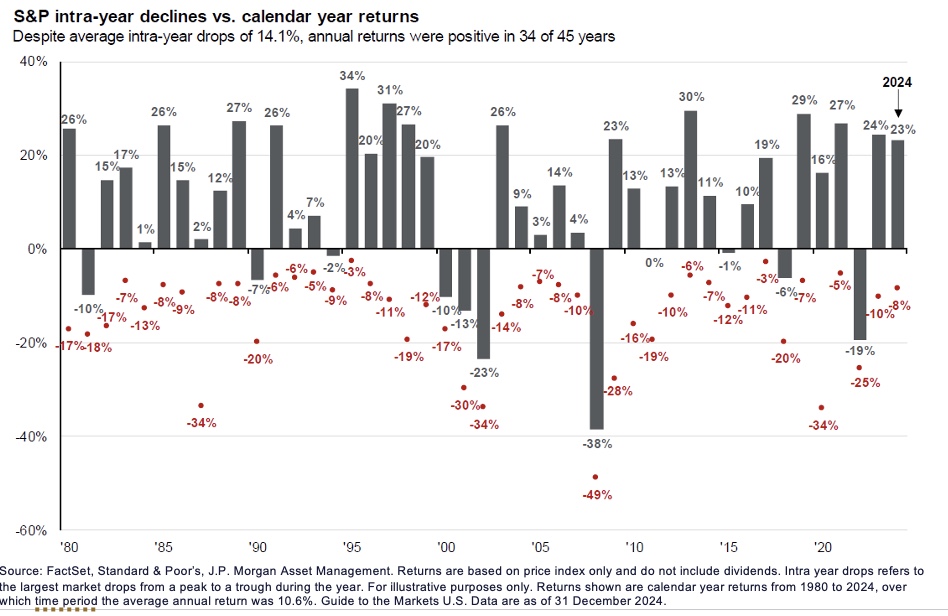
Volatility risk is mitigated by TIME in the market
Volatility is part and parcel of investing, and your investment time horizon almost without exception determines the likelihood of investment success. This chart shows the annualised returns over four different time frames (1, 5, 10 and 20 years) using data from 1950 to today.
A 50/50 portfolio of shares and bonds (the green bar) shows that in the last 75 years you could lose up to 24% or gain up to 49% in any given one year period.
However, over every 10 year rolling period in that same 75 years, your worst possible return would be 1% p.a, (ie. no loss) and the best would be 17% p.a.
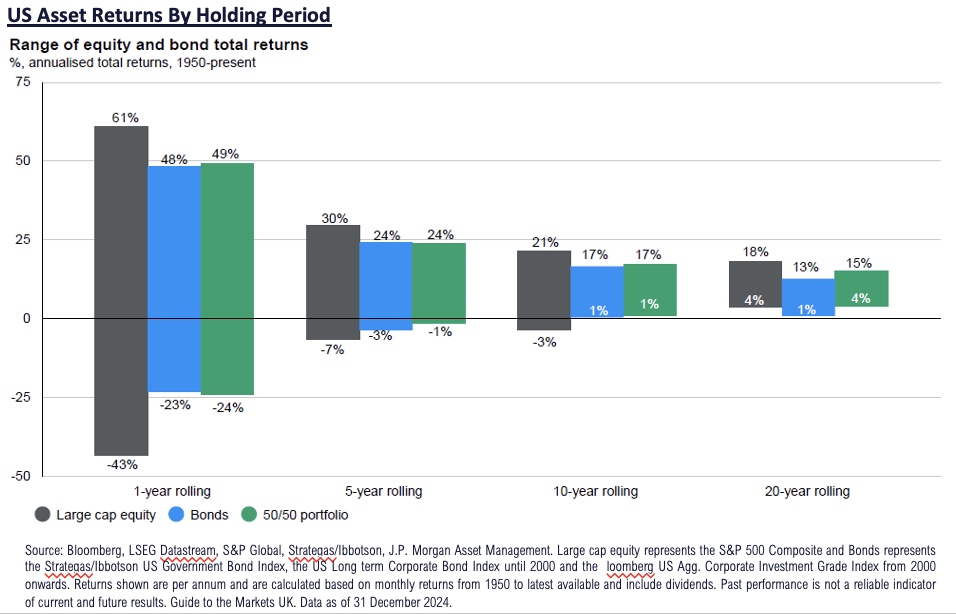
The longer the investment term, the less relevant volatility becomes, and crucially, the longer the investment term, the greater the likelihood of investment success.
What’s the something bad? – Not maintaining a long-term perspective and reacting impulsively to market swings.

Longevity Risk: Outliving Your Wealth
With increasing life expectancy, investors must consider the risk of outliving their assets.
For a couple aged 65 today there is a 92% chance that one of them will live to 80 and a 49% chance one will live to 90.
Planning for a longer retirement by investing must now include more exposure to growth-oriented assets.
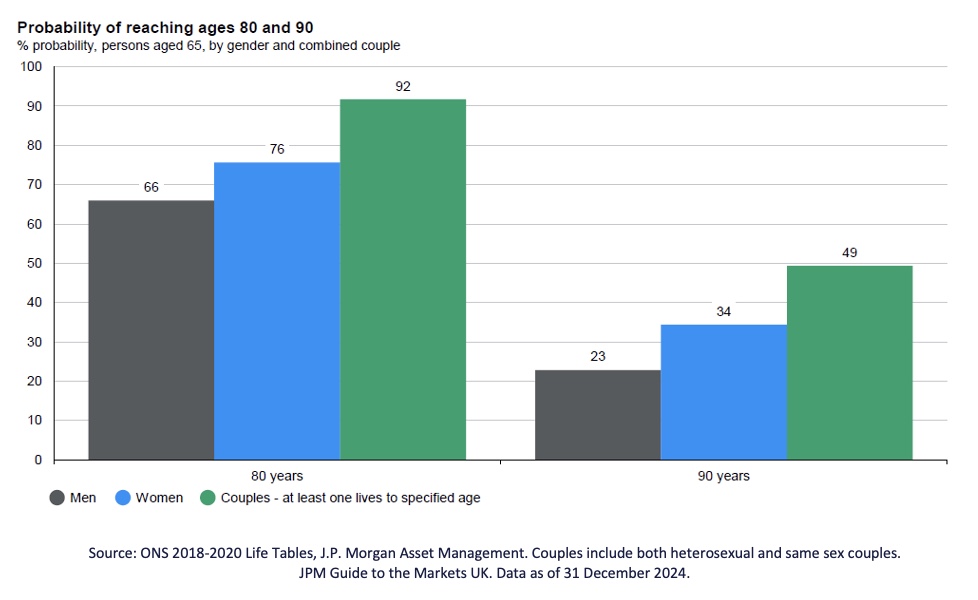

Sequencing Risk/ The Timing of Returns Matters
For retirees or those drawing an income from investments, sequencing risk— the order in which returns occur— can significantly impact portfolio longevity.
A market downturn early in retirement can lead to a faster depletion of funds compared to a downturn later in retirement.
Strategies like maintaining a cash reserve, actively managing portfolio risk as you approach retirement and diversifying investment assets will help.
What’s the something bad? – A market correction just at the point of retirement can significantly impact the quality of that retirement.

ROMO – The Risk Of Missing Out: The Cost of Not Investing
As well as the risk of not keeping up with inflation, there is also a significant risk (and great financial cost) in staying out of the market.
The ‘magic of compounding’ delivers substantial rewards for the patient, long term investor.

The 8 – 4 – 3 Rule
- The first 8 years is a period where money grows steadily
- The next 4 years is where it accelerates
- The next 3 years is where the snowball effect takes place
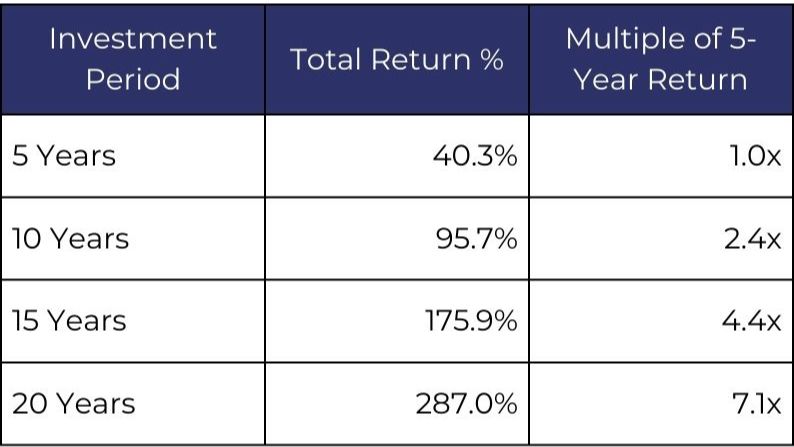
Here is a table showing the compounding effect of a 7% annual return:
What’s the something bad? – The risk of doing nothing and not benefiting from compounding returns.

Currency Risk
Expatriates often have assets in one currency but expenditure in another; for example a Pension in British Pounds and outgoings in Euros.
As global investors there will always be some form of underlying currency risk but mitigating the practicalities of moving money around from one currency to another is possible with careful planning.
Options could be:
- Take all the currency risk at the start – ie transfer the whole ‘pot’ today to your expenditure currency – a one off risk.
- Take all the currency risk at the end – exchange the money to your expenditure currency when you draw the money out; this might be better as it may spread the risk over time.
- Manage the currency – you could set up your account in your expenditure currency (e.g. Euros) but keep the underlying investments in their original currency (e.g. GBP) and then create a strategy to move the money over time to match the outgoings.
What’s the something bad? – The risk of not correctly matching your assets with your liabilities – a large fluctuation affects your lifestyle.

Assessing Your Attitude to Risk:
All of the above is to help our conversation about ‘RISK’ but in order to best set up and review your investment portfolio we have a 3 part process to determine exactly how much investment risk you can tolerate:
1. Your ATTITUDE to risk – this is a psychometric test, via a questionnaire, to assess your in-built view on risks, volatility and returns.
2. Your CAPACITY to take risk – this is a deeper understanding of your overall situation and therefore your ability to weather ups and downs in portfolio values… i.e. do you have other assets, a large pension or property income; how reliant are you on your portfolio at any given time?
3. Your TIME HORIZON for investing – when do you need to access to this money? Will the access be to draw an income or large lump sums or even, all of the fund in one go? Or is this money just to be invested to pass on to beneficiaries?
The answers to these 3 questions provide us with a ‘score’ and ‘understanding’ of how you will use the money being invested… this allows us to assign a ‘Risk Benchmark’ to your portfolio, from which we will determine its asset allocation and then monitor its performance and volatility for the duration of the investment.
Obviously, your TIMESCALE changes over time and your CAPACITY can change as your life situation changes; even if you maintain the same inherent ATTITUDE to risk we must always review and monitor the overall position of your portfolio and potentially change your benchmark as time passes.
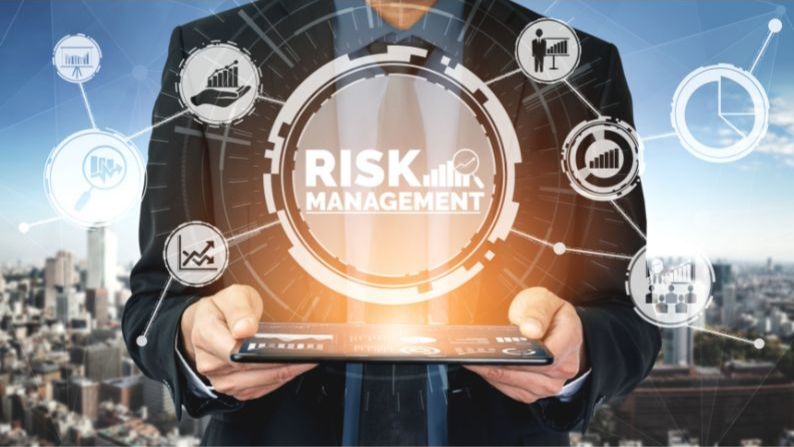
Final Thoughts
Investing always carries ‘risks’, but knowledge and strategy can help manage them effectively. Whether it’s inflation, market fluctuations, or longevity concerns, working with a financial adviser ensures that risk is considered within a well-thought-out plan. Overall doing nothing is the largest risk.
Staying focused on long-term goals, and avoiding emotional reactions to short-term market movements, usually leads to successful financial outcomes.
I would very much like to thank the team at RBC Brewin Dolphin for their kind input and help with this article, I truly hope you found it useful.
If you’d like to discuss your investment strategy and how to manage these risks, feel free to get in touch!
Live Webinar – Buying your dream home in France
By Alan Watson
This article is published on: 25th March 2025

ONLINE LIVE WEBINAR
Join our expert panel on Thursday 27th March
18.00 (GMT), 19.00 (CET)
An informative webinar where our panel of experts will address topics such as relocating to France, mortgage, visas, buying and living in France, and currency transfers. We will also provide insights into the buying process in France.



